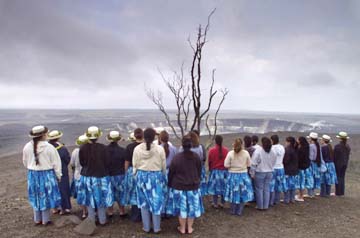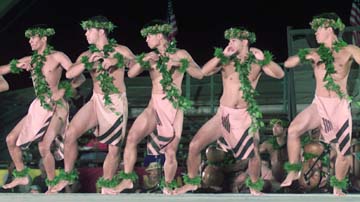


|
Kumu’s spirit HILO >> It's commonly said that it takes the Merrie Monarch Festival to arouse this sleepy seaside town from its slumbers, with most of the credit going to the annual invasion of hula fanatics. That the dead help bring Hilo back to life is not generally acknowledged.
As her halau returns to Merrie Monarch,
Maelia Carter cherishes the influence
of her feisty grandmother,
the late Mae LoebensteinBy Scott Vogel
svogel@starbulletin.com"She drove, she climbed trees, she did anything -- my grandmother was healthy until the day she died."

|
Sitting in the same room they always booked for the festival -- Suite 800 at the Naniloa Hotel -- Maelia Carter stares out at the clouds hanging heavily over tranquil Hilo Bay. It's a familiar scene, minus the presence (physical, that is) of her grandmother, the legendary "Auntie Mae" Loebenstein, who died in 1997."Grandma and I used to sit here every morning. She liked to get up before sunrise." Carter's reminiscence is fond but very personal, and for a while you wonder if she'll burst into tears. Instead she surprises you with an explosive laugh.
"You know, the old only need three hours of sleep at night!"
The Merrie Monarch festival wraps up with the 'auana competitions at 6 p.m. today on KITV. On the air:
It goes without saying that this trip down Merrie memory lane is an emotional one for Carter, who's now both kumu hula for Ka Pa Hula O Kauanoe O Wa'ahila halau and de facto guardian of her grandmother's rich legacy. But one also senses that her halau's return to competition -- their first since 1998 -- was inevitable, one more instance of Auntie Mae getting the last word.
"Grandma said, 'You have to be strong. A Hawaiian woman's role is that of strength, because the family depends on us. No matter what happens, you still have to get everything done.'"
That's a demanding creed for any woman (or any man) to live by, but Loebenstein apparently followed it to the letter for 86 years, right up until the last hula class she gave, after which she retired to a room behind the studio for a nap. Later, Carter's mother went to check on her.

|
"She had already turned blue" -- it was an aortal aneurysm, one that might have killed a lesser woman immediately, says Carter. But Loebenstein hung on for more than a day, just enough time for her granddaughter to rush home from a mainland vacation and say goodbye. "Tell her she'd better not leave before I get back," Carter remembers saying to her mother at the time, thereby challenging Loebenstein to one more feat in a long life of accomplishments."She was such a dynamic personality. She could walk into a room, and without saying anything she would just command your attention. She was the epitome of a Hawaiian woman. She was confident, she was beautiful and she was definitely not afraid to speak her mind."

|
Loebenstein -- whose 60-year career as a singer and musician took her to cruise ships and Waikiki hotels, not to mention several USO tours -- had her detractors, thanks in part to her sharp tongue. But she was no dragon lady, says Carter. Her ferocity, when it appeared, was usually directed at those who, by their actions and comportment, were an embarrassment to a great heritage."'You need to be carrying yourself like a proud Hawaiian woman,' she would tell the girls in the halau. 'You need to sit like a lady.' There was none of this running around in shorts and acting like hoodlums."

|
For Loebenstein, who "never walked out of the room with a hair out of place," proper dress was as important as good discipline. "It was like halau and charm school all wrapped up in one."And like all worthy ideas from eras past, it might have died off with its adherents, save for another strong, indomitable woman determined to uphold standards some might call archaic.
That would be Carter, whose strength as a Hawaiian woman was once again tested just last year after her mother died of ovarian cancer in the days preceding the 2001 Merrie Monarch Festival. But once more, Carter sought solace in the discipline and serenity of hula, and once more, the dance came to her rescue.

|
All this talk of rescue and remembrance put her in mind of an old story widely circulated within her family, one in which her mother and grandmother were principal figures. Little Maelia, just 212, was happily living in California with her five siblings until one day when Grandma paid a visit, announcing that she wanted to adopt one of her daughter's children and take her back to the islands."But she wanted a Hawaiian grandchild," says Carter, "as in non-Western-acting." But which of the children should she pick?

|
"The story Grandma told us was that while she was visiting she opened up a can of salmon with onions for her and my mom. And I made the comment -- remember, I was 2 -- 'Grandma, why are you eating cat food?' And she's like, 'That's it. I'm taking this baby home with me.'"The pair, once and future kumu hula, boarded the next plane to Hawaii.